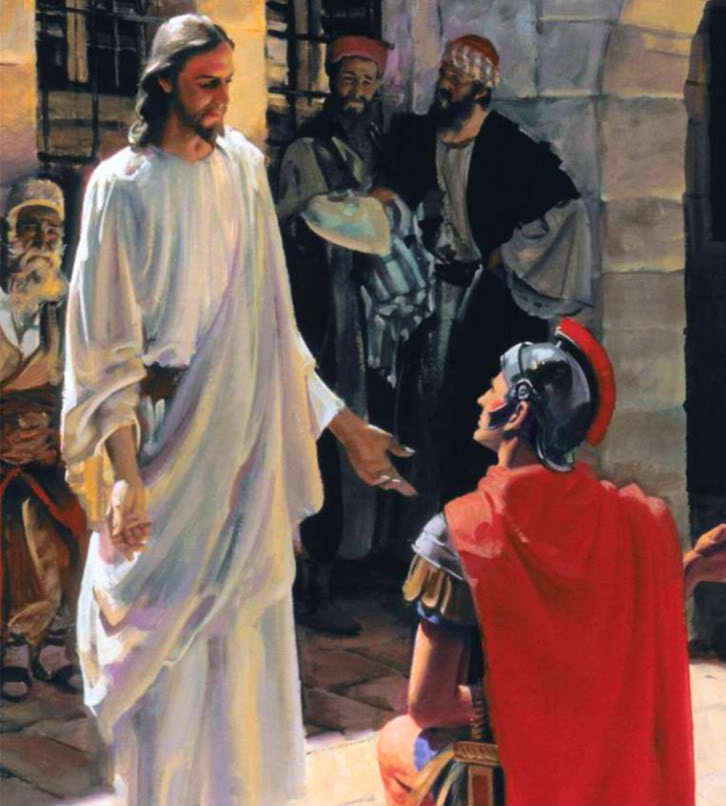Today in the celebration of the Eucharist there’s a change of color of vestments to celebrate a change of season. It’s not just that the weather is getting colder: today we begin a new season in the liturgical year and a new liturgical year. Yesterday was the end of the last liturgical year, and symbolized the end of time when Christ will come to definitively overthrow sin and death so that we can live forever with him and everyone we love. We celebrated that last Sunday by celebrating the Solemnity of Christ the King.
This Sunday we begin the season of Advent. “Advent” means “coming.” Last Sunday we celebrated the Second Coming of Christ, which is going to come in the future; during Advent we prepare to celebrate the First Coming of Christ. Christ’s First Coming happened on Christmas. Actually, it happened at the Annunciation, which was when he became man and why that feast is also called the Feast of the Incarnation, but he was born at Christmas, which is also called the Feast of the Nativity.
During the liturgical year we celebrate all the mysteries of Christ’s life, from the beginning of time, even before he became man and came to earth, until the end of time, when he will return and lead us to eternal life with him and everyone we love. We also celebrate the whole history of salvation during the liturgical year. In Advent we celebrate the start of the history of salvation, before Christ’s First Coming to earth at Christmas.
In today’s Gospel Jesus is speaking about his Second Coming, but the question for both Comings of Christ is the same: How are you getting ready? How do you answer that question? It’s going to influence how you live Advent a lot. Is it “finally!”? Is it “yeah, right…”? Is it “yikes”? Those answers are not answers to what gifts you’re going to get, what family you’re going to see, or how much you’re going to eat: they’re answers to how you are getting ready for Christ’s coming at Christmas.
The Second Reading and the Gospel today remind us that he is coming at an unexpected moment. For the Israelites that was nothing new, but what they didn’t imagine was that the Messiah, the Savior of the World, would come in such an unexpected way: as a little baby in a manger. What’s your response to the Savior of the World coming as a little baby and lying in a manger? Maybe the question “Are you getting ready?” takes on a different light when you consider how he is coming. For the Israelites, the coming of the Messiah was going to be at the end of time: he was coming to defeat all their enemies and clean house. Instead he came as a little baby, way ahead of schedule. How did they respond? Some saw a little baby in a manger and said, “he’s not the Messiah, come on….” Others didn’t even believe in a Messiah to begin with, and didn’t change their opinion: “yeah, sure, the Savior of the World…right.” Christians are often on the fence: Some have the same attitude as the Israelites and the skeptics, but others are saying, “yikes,” because the Second Coming is all they have on their mind, and they know they’re not ready.
Advent is a time to get ready the real Christian way, just as today’s Psalm says: “Let us go rejoicing!” Rejoicing is the Christian way to respond to the question Jesus is asking in the Gospel today. In today’s First Reading Isaiah prophesies the coming of the Messiah as time of peace and blessings for all nations forever – that is cause for rejoicing. Isaiah’s prophecy began to be fulfilled in the First Coming, when the Savior of the World was born, and will be fulfilled in the Second.
In the First Coming and the Second Coming Christ is not letting us go it alone. When St. Paul in the Second Reading today reminds us that “our salvation is nearer now that we first believed,” he’s reminding us that Christ is nearer to us now because he is one of us. God became man. At Christmas we’ll be celebrating the fact that God is with us as one of us. We have to do our part, we have to change our lives, but shielded by the “armor of light,” “putting on the Lord Jesus Christ,” as St. Paul encourages us to do: by living a Christian life we are helping Christ to fulfill that prophecy of Isaiah.
Let’s begin Advent by preparing ourselves joyfully for Christ’s coming. The Lord has given us a whole liturgical season to get ready for his Coming: four whole weeks. Ask him to help you keep him in the center of your preparation for Christmas. Christmas is going to be a time for family, friends, and rest, but it is also a time for rejoicing, because the Savior of the World is going to be born. Let’s start Advent with joyous expectation.
Readings: Isaiah 2:1–5; Psalm 122:1–9; Romans 13:11–14; Matthew 24:37–44. See also 21st Week in Ordinary Time, Thursday.



